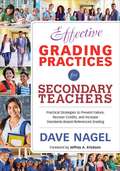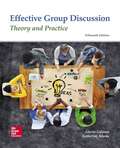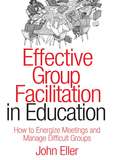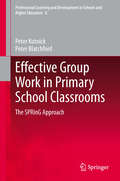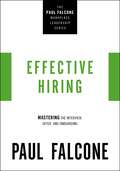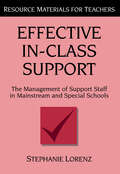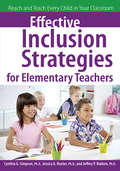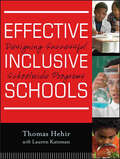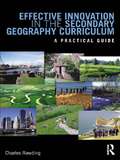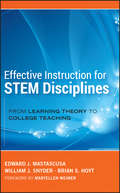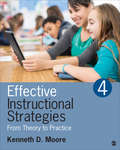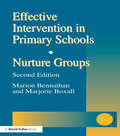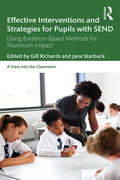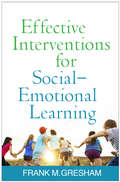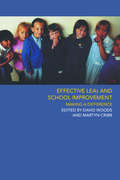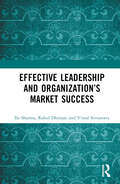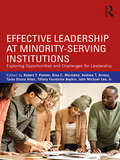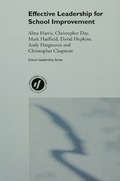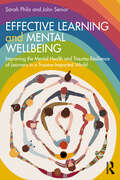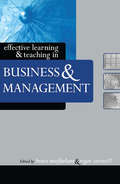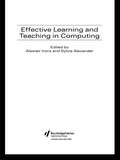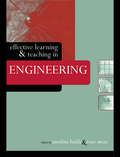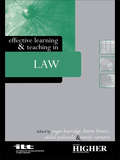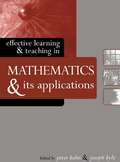- Table View
- List View
Effective Grading Practices for Secondary Teachers: Practical Strategies to Prevent Failure, Recover Credits, and Increase Standards-Based/Referenced Grading
by Dave NagelEnact innovative grading systems that more accurately describe student progress! This book challenges traditional grading practices and provides alternatives that can have direct impact on student success. By making subtle shifts toward standards based grading systems, schools can reduce unnecessary course failures, provide students and their families a more accurate picture of current progress, and increase opportunities for success. The author offers a range of grading reform strategies that are built from practical frameworks that are effective and simple to adapt. Among the many strengths of this book are: Practical application of existing research and evidence base for effective secondary grading reforms A framework for schools and districts to apply and adapt failure prevention strategies such as early failure detection, Amnesty Days, and meaningful stipulated second chance opportunities for students to reach mastery Functional strategies and actions for shifting toward standards-based (referenced) grading without entirely abandoning letter grades Countering resistance to change through a-clearly-articulated plan for conducting school-wide and classroom level action research around the effectiveness of new or adjusted grading practices "Informative and pragmatic, this book is spot on with analysis of this elephant in the room issue. Nagel uses both empathy and humor in getting to the heart of a process to generate real solutions while underscoring the ultimate need for teacher voice in any successful implementation. He provides ready-made strategies for real, impactful change. I′m left hopeful that feedback will rule the day!" —Bruce Potter, Superintendent Berkshire UFSD "Nagel offers an insightful and articulate voice to secondary improvement and alignment through grading practices. His tried and true methods through working with real districts provides a starting place and examples for others to follow. A must-read for anyone serious about ensuring student engagement through meaningful feedback." —Debra K. Howe, Superintendent Tri-Creek School Corporation ?
Effective Group Discussion: Theory and Practice
by Katherine L. Adams Gloria J. GalanesNow in its fifteenth successful edition, Effective Group Discussion combines the most recent research findings and practical tools students need to become productive group members. A variety of secondary groups are covered in the text: work groups, committees, task forces, self-directed work teams, and other small groups whose objectives include finding solutions to problems, producing goods, and creating policies.
Effective Group Facilitation in Education: How to Energize Meetings and Manage Difficult Groups
by John F. EllerTap into proven do's and don'ts for facilitating dynamic and productive meetings. Get tips on team building, brainstorming, motivating, delegating, and more.
Effective Group Work in Primary School Classrooms: The SPRinG Approach
by Peter Blatchford Peter KutnickThis book offers a challenge to traditional approaches to classroom teaching and pedagogy. The SPRinG (Social Pedagogic Research into Groupwork) project, part of a larger research programme on teaching and learning funded by the Economic and Social Research Council (ESRC), was developed to enhance the learning potential of pupils working in classroom groups by actively involving teachers in a programme designed to raise levels of group work during typical classroom learning activities. Internationally, the SPRinG project is the largest evaluation of effective group working methods in comparison to traditional teaching, with findings that show raised levels of pupil achievement and a doubling of sustained, active engagement in learning. The opening chapters present arguments regarding the relationship of social interaction and children's cognitive development and examine theories that explain why social interactional processes should be integrated into primary school pedagogic practices. Next, the book describes the conceptual and methodological basis for the SPRinG studies, especially its focus on the relational approach, the type of involvement of teachers and classroom planning. Further chapters present key results and describe the background and methods used to establish SPRinG-based effects on pupil progress in mathematics, literacy and science, including both macro and micro assessments; how the SPRinG approach affected pupil-pupil interactions and teacher-pupil interactions, as measured by systematic on-the-spot observations and analyses of videotapes of groups working on specially designed tasks work; and effects on pupil self-completed measures of motivation and attitudes to group work. The book also analyses reflections of teachers who have worked with SPRinG: moving from theory to practice as well as adding insights associated with implementing SPRinG principles in schools. Drawing upon developmental psychological, social psychological and classroom research, it develops a new and ambitious social pedagogic approach to classroom learning, with a stress on group work, which will be of interest to researchers, teachers and policy-makers. This book includes contributions from Andrew Tolmie and Ed Baines, who were also involved in the ScotSPRinG and SPRinG projects.
Effective Hiring: Mastering the Interview, Offer, and Onboarding (The Paul Falcone Workplace Leadership Series)
by Paul FalconeSimplify the hiring process and put the right people in place the first time with the help of scripts, templates, and tools you can apply immediately, from the leading voice in HR expertise. Part operational field manual, part guiding hand, Paul Falcone, a renowned expert on effective hiring, performance management, and leadership development, walks you through some of the most critical people challenges you&’ll face and provides the keys to getting the results you&’re looking for during the interviewing, hiring, and onboarding process.Chock full of leadership wisdom from Falcone, this book:Examines the most often used interview questions and offers new interpretations when reading candidate responses.Identifies the red flags in the candidate assessment process, such as people who give long inventories of unproven claims that delay getting to the answer to your question.Provides small business owners who often struggle to meet crucial HR demands with simple tools to guide them through effective interviewing, hiring, and onboarding.Getting the best employees on board and weeding out the worst—without getting slapped with expensive lawsuits—are two of the most crucial and difficult jobs of human resources professionals and general managers. This book provides quick, reliable information on how to do it right. asy to understand series will serve as a reference for managers who need to quickly understand complex HR concepts.
Effective In-Class Support: The Management of Support Staff in Mainstream and Special Schools
by Stephanie LorenzFirst Published in 1999. Routledge is an imprint of Taylor & Francis, an informa company.
Effective Inclusion Strategies for Elementary Teachers
by Cynthia Simpson Jessica Reuter Jeffrey BakkenWritten in a very reader-friendly style with many examples and suggestions, Effective Inclusion Strategies for Elementary Teachers addresses some of the very important issues elementary school teachers face when working with students with disabilities. Topics include an overview of disability laws and definition of inclusion, followed by chapters on students with specific disabilities (autism spectrum disorders, ADHD, learning disabilities, emotional and behavioral disorders, speech and language impairments, hearing impairments, visual impairments, orthopedic impairments, and intellectual disabilities).The remaining chapters in this book discuss the very important topics of technology, collaborating with families, and Response to Intervention. This guide for elementary school teachers is a resource they can come back to over and over again!
Effective Inclusive Schools
by Thomas Hehir Lauren KatzmanHow to raise the achievement of all kids, from gifted to those with severe disabilities This book presents lessons learned from in-depth case studies of some of our most effective inclusive public schools. The authors conclusively demonstrate that schools can educate students with mild and severe disabilities in general education classrooms by providing special education services that link to and bolster general education instruction. This goes beyond complying with Special Education law; having a truly inclusive environment raises the achievement level for all students and results in more committed and satisfied teachers. Insights shared from teachers, school leaders, parents, and the students themselves provide a path forward for anyone striving to Improve special education services. The authors reveal what these exemplary schools do that makes them so successful, and provide advice for readers who want to incorporate these practices themselves. Hehir, former U. S. Office of Special Education (OSEP) Director, is a leading name in Special Education Highlights the important relationships between administrators, teachers, and parents to foster maximum collaboration between general and special education Includes information on committing to Universal Design for Learning (UDL) and Positive Behavior Supports This vital resource zeroes in on what excellent public schools do differently to ensure all students succeed.
Effective Innovation in the Secondary Geography Curriculum: A practical guide
by Charles RawdingHow up-to-date is your geographical thought? Are parts of your curriculum becoming tired and out-dated? Effective Innovation in the Secondary Geography Curriculum will help training and practising secondary school teachers understand how to evaluate and refresh their curriculum in order to ensure that what they teach is relevant, topical and creative. Considering the latest developments in both the school geography curriculum and the field of geography as an academic discipline, this exciting new book explores how geography teaching and learning can be developed to engage secondary school pupils and better reflect contemporary society. Illustrated throughout with ideas and practical examples of how to update your curriculum easily and effectively, key topics covered include: Understanding curriculum theory and development; Auditing and developing your own dynamic, interactive curriculum; Critiquing textbooks and resources to ensure relevance; Constructing and analysing schemes of work; Incorporating the latest developments in the field into your teaching; How to create innovative, enduring curricula for human, physical and environmental geographies. Providing insights into the latest thinking in geography in a concise and accessible manner, Effective Innovation in the Secondary Geography Curriculum will ensure motivating, lively and successful geography teaching and learning.
Effective Instruction for STEM Disciplines
by Maryellen Weimer Edward J. Mastascusa William J. Snyder Brian S. HoytThis groundbreaking book offers information on the most effective ways that students process material, store it in their long-term memories, and how that effects learning for long-term retention. It reveals how achieving different levels is important for "transfer" which refers to the learner's ability to use what is learned in different situations and to problems that might not be directly related to the problems used to help the student learn. Filled with proven tools, techniques, and approaches, this book explores how to apply these approaches to improve teaching.
Effective Instructional Strategies: From Theory to Practice
by Kenneth D. MooreA concise and easy-to-read K-12 methods text that covers practical information all teachers need to be effective Kenneth Moore’s Fourth Edition of Effective Instructional Strategies: From Theory to Practice provides thorough coverage of the strategies and essential skills that every teacher needs to know. This text applies the latest research findings and useful classroom practices to the instructional process by presenting a Theory to Practice approach to instruction, emphasizing the intelligent use of teaching theory and research to improve classroom instruction. Logically and precisely providing information about how to be an effective classroom teacher, this text has been carefully designed to maximize instructional flexibility and to model established principles of instruction. It was further designed to expand the pedagogical teaching knowledge of teachers and their instructional repertoires.
Effective Intervention in Primary Schools: Nurture Groups
by Marion Bennathan Majorie BoxallFirst Published in 2001. Routledge is an imprint of Taylor & Francis, an informa company.
Effective Interventions and Strategies for Pupils with SEND: Using Evidence-Based Methods for Maximum Impact (A View into the Classroom)
by Gill Richards Jane StarbuckEffective Interventions and Strategies for Pupils with SEND offers practical, tried-and-tested strategies for supporting and championing pupils with special educational needs and disabilities. Each strategy has been researched, trialled and reviewed, with the results presented accessibly and the concerns of real teachers a key focus of the discussion. With each chapter written by an experienced and innovative teacher working with children with SEND, this book covers a wide range of strategies for supporting pupils with SEND. These effective strategies include: Using a ‘daily run’ to improve concentration and behaviour Creating SEN champions and more effective teaching assistants Embedding anxiety-reducing strategies in the classroom. Written for teachers by teachers, Effective Interventions and Strategies for Pupils with SEND is an indispensable resource for all SENCOs and other educators and staff working with children with special educational needs looking to provide the best learning experiences possible.
Effective Interventions for Social-Emotional Learning
by Frank M. GreshamThis book reviews evidence-based, multi-tiered practices for promoting social-emotional learning (SEL) with typically developing students as well as those with special needs. Leading authority Frank M. Gresham, codeveloper of the Social Skills Improvement System--Rating Scales, describes how to systematically assess K-12 students' social skills and plan and implement universal, selected, and intensive interventions. His approach is grounded in cutting-edge research on social-emotional competencies and their role in adjustment and academic achievement. Emphasizing what works, the book showcases programs and strategies that are sequenced, active, focused, and explicit. Detailed case examples and lesson plans illustrate different levels and types of SEL intervention. Reproducible assessment tools can be downloaded and printed in a convenient 8 1/2" x 11" size.
Effective LEAs and School Improvement
by David Woods Martyn CribbEffective LEAs and School Improvement examines the ways in which Local Education Authorities can support and challenge schools to raise educational standards. The book includes case studies of effective LEAs and interludes from heads and governors on their experience of working with LEAs.Effective LEAs and School Improvement enables Local Education Authorities to learn from existing good practice and to reflect upon their current situation and plan ahead to meet future demands. It is essential reading for all LEAs concerned with raising educational standards.
Effective Leadership and Organization’s Market Success
by Rahul Dhiman Ila Sharma Vimal SrivastavaEffective leadership and organizational performance are concepts that continue to receive widespread attention in the business world. This book explores the importance of strategic leadership and the value it adds to organizations. It focuses on strategies to achieve market success and organizational performance as well as the challenges of leading in a fluctuating market. The book looks at recent trends in leadership development and the different styles of leadership. It dispels existing myths about leadership and offers an understanding of principles which will allow leaders to be more adaptable and effective and steer businesses and organizations into a more stable future. This book will be of interest to researchers and students working in the field of business, organizational communication, business management, human resource management and business studies.
Effective Leadership at Minority-Serving Institutions: Exploring Opportunities and Challenges for Leadership
by Dina C. Maramba Taryn Ozuna Allen Robert T. Palmer Andrew T. Arroyo Tiffany Fountaine Boykin John Michael Lee Jr.Strong, effective, and innovative leadership is critical for institutions of higher education, especially for Minority-Serving Institutions (MSIs). Indeed, research and examples have shown leadership instability among some types of MSIs, while discussions and research on effective leadership for other MSIs is noticeably absent from the extant literature. In this volume, noted experts, researchers, and leaders discuss opportunities and challenges for leadership across the full range of MSIs, while creating a dialogue on leadership models and best practices. Chapters explore issues at Historically Black Colleges and Universities (HBCUs), Hispanic Serving Institutions(HSIs), Tribal Colleges and Universities (TCUs), and Asian American and Native American Pacific Islander Serving Institutions (AANAPISIs). This book helps higher education and student affairs scholars and administrators unpack contemporary leadership issues and strategies, and synthesizes best practices to help MSI leaders increase the effectiveness and sustainability of their institutions.
Effective Leadership for School Improvement
by David Hopkins Andy Hargreaves Alma Harris Christopher Day Mark Hadfield Christopher ChapmanIn a complex and multi-layered world, the conventional idea of great leadership being the result of the efforts of a single individual is rapidly becoming redundant. This book takes up the challenge of finding an alternative method of leadership in educational contexts, and looks at how this can help achieve sustained improvement in schools.The authors acknowledge that there are no simple solutions to school improvement. They argue that the effective leaders of the future will be those who are able to share responsibility, build positive relationships and offer stakeholders - teachers, parents and students - an opportunity to work together to improve their schools.The book is based around four key areas of concern: the changing context of leadership, leadership and school improvement, building leadership capacity, and future direction and implications. In each section, the authors discuss current theories and issues, and put forward alternative ideas and perspectives.This important book will make valuable reading for headteachers, principles, deputies and other senior teachers, particularly those undertaking leadership qualifications and training. It will also be of interest to postgraduate students and school governors.
Effective Learning and Mental Wellbeing: Improving the Mental Health and Trauma-Resilience of Learners in a Trauma-Impacted World
by John Senior Sarah PhiloResearch shows that by improving the wellbeing of learners, we also improve their learning. Effective Learning and Mental Wellbeing is a crucial resource, filled with ready-to-use and thought-provoking activities that support wellbeing within your school, college, organisation, community group or on your own. Woven throughout are ideas and activities that support learning and wellbeing for many different kinds of learner. Supported by well-researched content, this essential book will enrich and improve both the wellbeing and the learning of all who use it. Areas covered include but are not limited to: How we learn and blocks to learning Mental health and self-efficacy Positive steps to mental wellbeing Wellbeing in the connected learning community The future of wellbeing and learning This book is an essential resource for teachers, therapists, health professionals, parents or carers and those in the community who work to improve learning through improving wellbeing.
Effective Learning and Mental Wellbeing: Improving the Mental Health and Trauma-Resilience of Learners in a Trauma-Impacted World
by John Senior Sarah PhiloResearch shows that by improving the wellbeing of learners, we also improve their learning. Effective Learning and Mental Wellbeing is a crucial resource, filled with ready-to-use and thought-provoking activities that support wellbeing within your school, college, organisation, community group or on your own. Woven throughout are ideas and activities that support learning and wellbeing for many different kinds of learner.Supported by well-researched content, this essential book will enrich and improve both the wellbeing and the learning of all who use it. Areas covered include but are not limited to: How we learn and blocks to learning Mental health and self-efficacy Positive steps to mental wellbeing Wellbeing in the connected learning community The future of wellbeing and learning This book is an essential resource for teachers, therapists, health professionals, parents or carers and those in the community who work to improve learning through improving wellbeing.
Effective Learning and Teaching in Business and Management (Effective Learning and Teaching in Higher Education)
by Bruce Macfarlane Roger OttewillWritten to meet the needs of teachers, lecturers and tutors working at different levels and in many situations, this is the guide to surveying and understanding the key issues, best practices and new developments in business and management studies. Teaching in this field is a multi-faceted experience. The authors use an international perspective and support a wide range of situations by concentrating on five key areas: * the teaching and supporting of learning* the design and planning of learning activities* assessment and giving feedback to students* developing effective learning environments and student learning support systems* reflective practice and professional development. Practical and clear, this book will prove an invaluable guide for all those with an interest in developing business and management education and is essential reading for all those looking for professional accreditation for recognition of their teaching. It is also indispensable for the less experienced teacher seeking material for reflection and advice.
Effective Learning and Teaching in Computing (Effective Learning and Teaching in Higher Education)
by Alastair Irons Sylvia AlexanderWritten to meet the needs of teachers, lecturers and tutors, this is a comprehensive guide to understanding the key issues, best practices and new developments in learning and teaching in information and computer sciences in higher education.It covers a range of issues relating to teaching within the broad discipline of computing at under- and post-graduate level, including:* curriculum* assessment* links with industry* international perspectives* innovative techniques for teaching* effective use of ICT in teaching.Effective Learning and Teaching in Computing will be essential reading for less experienced teachers seeking authoritative guidance as well as experienced teachers seeking material for reflection and advice.
Effective Learning and Teaching in Engineering (Effective Learning and Teaching in Higher Education)
by Caroline Baillie Ivan MooreWritten to meet the need of teachers, lecturers and tutors at all stages in their career, this is the authoritative handbook for anyone wanting to and understanding the key issues, best practices and new developments in the world of engineering education and training. The book is divided into sections which analyse what students should be learning, how they learn, and how the teaching and learning process and your own practice can be improved.With contributions from experts around the world and a wealth of innovative case study material, this book is an essential purchase for anyone teaching engineering today.The 'Effective Learning and Teaching in Higher Education' series deals with improving practice in higher education. Each title is written to meet the needs of those seeking professional accreditation and wishing to keep themselves up to date professionally.
Effective Learning and Teaching in Law (Effective Learning and Teaching in Higher Education)
by Abdul Paliwala Roger Burridge Karen Hinett Tracey VarnavaEffective Learning and Teaching in Law will provide all law teaching professionals with practical, authoritative guidance and advice on the successful teaching of their subject in both university settings and as part of professional training and practice. Written to promote the development of and recognition of the professional role of the law teacher, this book will help educators equip law students of law with the intellectual and practical skills required to succeed in their studies. Key coverage includes assessment, the design and planning of learning activities, the use of IT in legal education and developing suitable learning environments.The book is edited by a leading team of legal educators for the UK Centre for Legal Education (UKCLE) at the University of Warwick, and includes expert contributions from leading figures in the field. It will be essential reading for anyone involved with legal education today and will be particularly relevant for those developing their teaching career, or seeking professional accreditation.
Effective Learning and Teaching in Mathematics and Its Applications (Effective Learning and Teaching in Higher Education)
by Peter Kahn Joseph KyleThe Effective Learning and Teaching in Higher Education series is packed with up-to-date advice, guidance and expert opinion on teaching in the key subjects in higher education today, and is backed up by the authority of the Institute for Learning and Teaching. This book covers all of the key issues surrounding the effective teaching of maths- a key subject in its own right, and one that forms an important part of many other disciplines. The book includes contributions from a wide range of experts in the field, and has a broad and international perspective.
